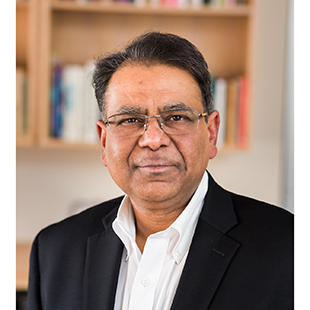ChE Seminar: Dr. Arup K. Chakraborty
| Event Date: | March 21, 2019 |
|---|---|
| Speaker Affiliation: | Massachusetts Institute of Technology |
| Time: | 3:00-4:15 pm |
| Location: | FRNY G140 |
| Contact Name: | Davidson School of Chemical Engineering |
| Open To: | Attendance required for PhD students |
| Priority: | No |
| School or Program: | Chemical Engineering |
| College Calendar: | Show |
 Dr. Arup K. Chakraborty
Dr. Arup K. Chakraborty
Robert T. Haslam Professor of Chemical Engineering
Professor of Physics, Chemistry, and Biological Engineering
Massachusetts Institute of Technology
- Seminar: Thu. Mar. 21, 2019 from 3:00-4:00 p.m. in FRNY G-140
- Panel: Thu. Mar. 21, 2019 from 4:15-5:15 p.m. in FRNY Atrium - Panel Moderator: Professor Doraiswami Ramkrishna, H.C. Peffer Distinguished Professor, Davidson School of Chemical Engineering, Purdue University
Part of the Purdue Engineering Distinguished Lecture Series
"How to hit HIV where it hurts"
Abstract
Vaccination has saved more lives than any other medical procedure. But, some pathogens have evolved which have defied successful vaccination using the empirical paradigms pioneered by Pasteur and Jenner. HIV, a highly mutable virus, is a prominent example. I will first describe how bringing together theoretical/computational approaches, rooted in physics and engineering, with basic and clinical immunology we developed models to translate data on HIV protein sequences to knowledge of the HIV fitness landscape, and how we then tested the resulting predictions against in vitro and clinical data (with collaborators). I will then describe how using this fitness landscape and models of the immune response and viral evolution, including affinity maturation induced my multiple variant antigens, we have designed immunogens and vaccination protocols for potentially potent T cell and antibody responses that have been advanced to pre-clinical studies in animal models.
Biography
Arup K. Chakraborty’s career has been focused on work that brings together approaches from different disciplines to understand diverse phenomena and harness that knowledge toward practical ends. He is currently the Robert T. Haslam Professor of Chemical Engineering, and Professor of Physics, and Chemistry at MIT. He served as the founding Director of MIT’s Institute for Medical Engineering and Science from February 2012 to January 2018. He is also a founding steering committee member of the Ragon Institute of MIT, MGH, and Harvard, and an Associate Member of the Broad Institute of MIT & Harvard. After obtaining his PhD in chemical engineering and postdoctoral studies, he joined the faculty at the University of California at Berkeley in December 1988. He rose through the ranks, and ultimately served as the Warren and Katherine Schlinger Distinguished Professor and Chair of Chemical Engineering, Professor of Chemistry, and Professor of Biophysics at Berkeley. He was also Head of Theoretical and Computational Biology at Lawrence Berkeley National Laboratory. In September 2005, Chakraborty moved to MIT. After an early career in guiding the engineering of polymers and catalysts using quantum mechanical calculations, since 2000, Chakraborty’s work has largely focused on bringing together immunology and the physical and engineering sciences; more specifically, the intersection of statistical mechanics and immunology. His interests span T cell signaling, T cell development and repertoire, and a mechanistic understanding of HIV evolution, antibody evolution, and vaccine design. Since 2016, he has also been interested in the role of phase separation in gene regulation. Chakraborty’s work at the intersection of disciplines has been recognized by numerous honors, including the NIH Director’s Pioneer Award, the E.O. Lawrence Medal for Life Sciences from the US DOE, Guggenheim Fellowship, the Allan P. Colburn and Professional Progress awards from the AIChE, a Dreyfus Teacher-Scholar award, and a National Young investigator award. Chakraborty was elected a member of the National Academy of Sciences and the National Academy of Engineering for completely different bodies of work. He is also a member of the National Academy of Medicine, making him one of 21 individuals who are members of all three branches of the US National Academies. He is a Fellow of the American Academy of Arts & Sciences and the American Association for the Advancement of Science, and serves on the US Defense Science Board. Chakraborty has received four teaching awards at Berkeley and MIT.
Learn more about Dr. Arup K. Chakraborty at: http://imes.mit.edu/people/faculty/chakraborty-arup-k/
